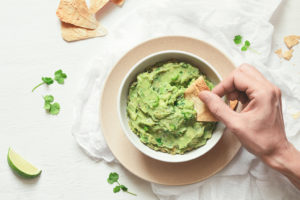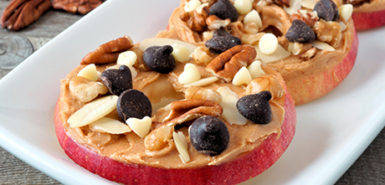
Double-dipping with a dance partner? A skillful move marked by grace and beauty.
Double-dipping with a snack at a party? Not quite so beautiful or graceful.
But definitely risky.
Using partially eaten food items such as vegetables or chips to scoop dip from a container can deposit bacteria from the double dipper’s mouth into the dip, which can make people ill if they dip into that same container, said Jessica Corwin, MPH, RDN, community nutrition educator for Spectrum Health Healthier Communities. Especially if the individual is sick.
Even a small amount of bacteria introduced by saliva can grow rapidly, perhaps to more than 100 times the initial level, potentially leading to serious illnesses such as a norovirus or herpes if the person has those viruses.
Even if the party guest is not sick, the bacteria they introduce can lead to foodborne illnesses.
While hosts and guests can take steps to protect partygoers from those who act carelessly with food, most of the precautions rest with the host.
Danger zone
For starters, dips that need to be kept cool should be placed on ice. Dips that need to be kept warm should be placed over the proper heating source, Corwin said.
“Forty-one to 140 degrees Fahrenheit is the danger zone,” she said. “That’s when bacteria can thrive.”
An extra-thorough host can use a thermometer to check temperatures.
The general rule: Leave food out no longer than two hours. If food is sitting outdoors, limit the time to one hour or less, depending on the temperature.
Also, set out smaller amounts of dip and replace them regularly with chilled dip stored in a refrigerator or cooler.
Some dips will grow bacteria more quickly than others, Corwin said. Runny dips, such as salsa and varieties made from sour cream, pose more of a threat than solid dips such as hummus.
And while it may be more tedious to prepare pre-portioned dip in containers, it could also be a wise move—especially if children are expected to attend the gathering.
“Kids are notorious for double-dipping,” Corwin said. As a mom of three, she speaks from experience.
Hands-free
At day’s end, there isn’t much that guests can do to protect themselves from double-dippers. One option is to bring your own food, or even abstain from eating, but that’s neither fun nor practical.
Still, precautions can be taken.
“If you’re dipping from something more solid, like hummus, take your helping from a portion not touched yet,” Corwin said.
Also, aim for dips that have serving utensils. If the host has set out serving spoons and dishes, people won’t need to double-dip—they can use the utensils to place an adequate amount of chips and dip on their plates.
Corwin emphasized the tried-and-true food safety mantra: “When in doubt, throw it out.
“As a host, anything you can do to take those extra precautions would be advisable,” she said. “You wouldn’t want any of your guests to leave sick, because you want them to come back.”
 /a>
/a>
 /a>
/a>
 /a>
/a>